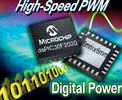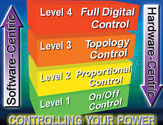

Microchip Technology has released a family of 16-bit dsPIC digital signal controllers (DSCs) for common, multiloop switch-mode power supplies (SMPSs) and other power-conversion applications. The dsPIC30F1010 and dsPIC30F2020/2023 (dsPIC30F202X) DSCs have a high-speed, 1 ns resolution pulse-width-modulator (PWM) and a 2 MSPS, 10-bit ADC onboard for low latency and high-resolution control.
The dsPIC digital signal controller is a 16-bit (data) modified Harvard RISC machine that combines the control advantages of a high-performance 16-bit microcontroller with the high computation speed of a fully implemented DSP. The devices are intended for AC/DC converters, isolated DC/DC power-converters and other power-conversion applications, such as embedded power-supply controllers, power inverters and UPSs.

Although Microchip's microcontrollers have long been used in intelligent power supplies for communications, power-sequencing, soft-start and topology control, until now, lack of effective solutions has hampered the development of supplies using digital control of the complete power-conversion loop. The dsPIC30F1010 and dsPIC30F202X DSCs now free designers to implement this type of complete digital control of their products.
"Power-supplies with higher power or complexity are now poised at a price threshold that is amenable to digital control," said Sumit Mitra, vice president of Microchip's Digital Signal Controller Division. "Our SMPS dsPIC DSC families were developed with input from leading power-supply manufacturers to tip the scale in favour of a digital approach. These devices accelerate innovation by giving early adopters newfound flexibility to create new topologies that were formerly impractical for analog approaches."
The new DSCs enable full control of the power-conversion process via software running on the DSC and through its high-performance integrated peripherals. According to the company, designers are no longer limited by analog-control design techniques. Components no longer need to be 'oversized' to account for component variation, and there is no need to worry about component drift and temperature compensation. Fewer product platforms are required to serve a wider range of applications, as they are differentiated through software, rather than hardware, it says.
Examples of applications that can benefit from the DSCs include power supplies with multiple outputs, coordinated load sharing, hot-swap capability, output coordination, integrated power factor correction or extensive fault-handling.
The PWM onboard the dsPIC30F1010 and dsPIC30F202X devices offers 1 ns duty cycle resolution and seven modes of operation, including standard, complementary, push-pull and variable-phase. The 10-bit A/D converter has up to 12 input channels and samples at up to 2 Msps. Advanced sampling capabilities include individual triggers for each of four sample and holds, and precise, uniquely timed or simultaneous sampling.
The dsPIC30F1010 devices have 6 KB of Flash and two PWM generators, and the dsPIC30F202X have 12 KB of Flash and four PWM generators. All devices in this family can operate from 3 to 5,5 V in a -40 to 125°C temperature range.
| Tel: | +27 11 923 9600 |
| Email: | [email protected] |
| www: | www.altronarrow.com |
| Articles: | More information and articles about Altron Arrow |
| Tel: | +27 11 458 9000 |
| Email: | [email protected] |
| www: | www.electrocomp.co.za |
| Articles: | More information and articles about Electrocomp |
| Email: | [email protected] |
| www: | |
| Articles: | More information and articles about Tempe Technologies |
© Technews Publishing (Pty) Ltd | All Rights Reserved